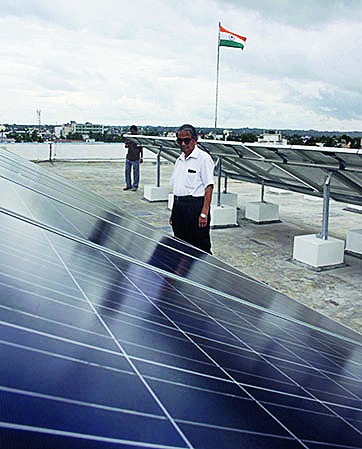The shifting trends in geopolitics signify the increasing importance of the European Union, especially for the Asian region. Even though the EU has always been a strong entity consisting of 28 member states, it does not figure that prominently in India's foreign policy conversation. The Union, represented by a cluster of 12 gold stars aligned in a circular formation against a deep blue backdrop, signifies the ideas of completion and perfection, traits that the EU is struggling to honour at present.
With security concerns mounting at its borders, building a reciprocal relationship with India becomes all the more important for the EU. In this context, the International Solar Alliance assumes a significant role in the energy sector. Touted as the next big thing, the ISA achieved considerable success at the talks in Bonn where it was given a legal status by the United Nations. Moreover, China's curiosity towards joining the ISA can be viewed as a significant shift in the present Indo-China discourse. Observers feel that this is a major victory for India as China is one of the largest manufacturers of renewable energy in the world. In addition to this, attaining a credible label of a UN treaty body has given a new meaning to New Delhi's efforts towards converting this alliance into reality.

The joint initiative between India and France has grabbed eyeballs from different quarters, especially from private players. The involvement of Yes Bank is an example. It has committed itself to mobilizing five billion dollars for solar power projects by 2030. The World Economic Forum meet in Davos was another platform that India and China focused on to discuss and debate a range of issues. Renewable energy was one of the subjects. In his keynote address, the Indian prime minister, Narendra Modi, pointed out that New Delhi was 'opening its door' for FDI. But the address did not underline how to go about tackling major issues, especially climate change.
Here is where the EU needs to be involved. The Union needs to be incorporated in the energy module. In 2015, France had taken the lead by expressing its support to push the cause of solar industry. Emmanuel Macron's visit to take part in the first international ISA meet will play a vital role in laying down its future course of action. Several investment opportunities are available in the solar power sector, but tapping the industry requires long-term policy modifications in order to compete neck to neck with the fossil-based energy. Concerted efforts directed at skill-labour development, coherent technological exchanges, innovative mechanisms for future research and development are some of the key factors that should inform the agenda of both Modi and Macron.
The ISA declared an ambitious target of initiating 100 solar projects by April at its recent conference in Abu Dhabi. However, financing these projects is going to be a challenge. At the same time, guaranteeing their continued maintenance will require innovative solutions.
The relationship shared by New Delhi and Brussels has to shape itself comprehensively in order to offer concrete resolutions that could give the necessary impetus to solar energy. The ISA is one of the best platforms for achieving this goal.










